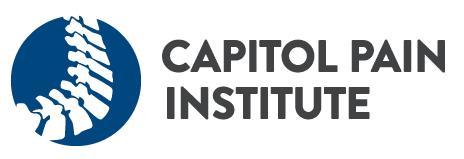Capitol Pain Institute
Capitol Pain Institute helps each patient using an individualized treatment plan to relieve pain. Together they build a comprehensive plan that gives patients ways to reduce their pain and suffering. Patients can also regain lost functionality. The integrative and comprehensive pain management approach combines cutting-edge research with well-grounded methodology to optimize patient care. Their doctors and nurse practitioners understand that treating a patient is a blend of diagnosing the physical disorder as well as addressing the mental challenge. They have one goal in mind ” get you back to the life you love.
Medical Team
Dr. Matt Schocket is board certified in both anesthesiology and pain management after completing his residency at UT-Southwestern in Dallas and fellowship at the University of California San Diego. He is the Founder and President of Capitol Pain Institute
Dr. Raimy Amasha joined Capitol Pain Institute after completing his pain management fellowship at Johns Hopkins Hospital and a research internship in stem cell therapy at Stanford University.
Dr. Timothy J. Beacham is a graduate of University of Mississippi School of Medicine (UMMC) in Jackson, Mississippi. He completed his internship and residency in anesthesiology at UMMC. He then completed a multidisciplinary pain fellowship also at UMMC. Dr. Beacham is board certified in Interventional Pain Medicine and Anesthesiology.
Dr. Neal Blauzvern joined Capitol Pain Institute in May 2016, after previously practicing for 22 years at Central Texas Spine Institute, where he was the sole pain management physician for a group of spine surgeons. He is fellowship-trained in pain management, and board-certified by the American Board of Anesthesiology in Anesthesiology, with their Certificate of Added Qualifications in Pain Medicine.
Dr. Juli Desai joined Capitol Pain Institute after completing her residency in Physical Medicine & Rehabilitation and fellowship in pain management at Temple University. Dr. Desais background provides her a variety of approaches to managing different types of pain.
Dr. Renee Doll joined Capitol Pain Institute in 2018 after previously practicing for 7 years, most recently in San Antonio. She is double board certified in Pain Management and Anesthesiology. She completed her residency training in Anesthesiology at Albany Medical Center and her pain management fellowship at Penn State Hershey Medical Center.
Dr. Dwight E. Mosley received his Bachelors degree from The University of Michigan, in Ann Arbor, Michigan. Dr. Mosley received his medical degree from The Ohio State University College of Medicine in Columbus, Ohio. He completed a general surgery internship at Riverside Methodist Hospital, in Columbus, Ohio.
Dr. Sameer Sharma is a double board-certified physician in pain management and physical medicine and rehabilitation. He completed his residency training in Physical Medicine and Rehabilitation (PM&R) at Hofstra Northwell School of Medicine in Long Island, NY and his pain management fellowship at Temple University in Philadelphia.
Dr. Steven I. Sloan is Board Certified in both Anesthesiology and Pain Medicine. He completed both his residency and fellowship at The Cleveland Clinic in 2005.
Their goal is to provide you with a compassionate, customized multi-disciplinary treatment that allows you to live a better life. We want our patients to focus on what they can do and what they would like to do if they were pain free. They offer a variety of traditional, alternative, and innovative medical treatments and our doctors spend time understanding your lifestyle before developing a treatment approach. Their newly built, state-of-the-art facilities ensure your comfort and safety for everything from office visits to minor procedures and even same-day surgery.
Pain and its causes
Most headaches can be treated with a pain reliever, however severe head pain can signal a dangerous or serious medical problem.
Pain in the hip joint itself is usually the result of pain on the inside of the hip and groin area. Pain on the outside of the hip, upper thigh or outer buttock is usually caused by problems with muscles, ligaments, tendons or other soft tissues.
The elbow joint is the hinge joint that connects the humerus in the upper arm and the radius and ulna in the forearm. It allows you to both extend and flex, as well as rotate your hand and forearm. Although not serious, elbow pain can cause severe discomfort.
Pain in the forearm, wrist or hand may stem from one of several rheumatic disorders or from a non-specific regional pain syndrome.
Besides, the cervical area of the spine is an interdependent network of bones, discs, nerves, and muscles. When this part of the body is subject to stress, injury, and impairment patients can experience mild to severe pain. The thoracic spine includes the upper- and middle-back which connects the cervical spine to the lumbar spine. It provides protection for vital organs in the chest and allows humans to stand upright. Pain in this area often has a benign musculoskeletal origin, but may indicate a more severe problem.
Pain below your ribs and above your hips is referred to as abdominal pain. Usually the pain that you feel here is caused by an issue with the gastrointestinal tract.
The thoracic spine includes the upper- and middle-back which connects the cervical spine to the lumbar spine. It provides protection for vital organs in the chest and allows humans to stand upright. Pain in this area often has a benign musculoskeletal origin, but may indicate a more severe problem.
Back pain includes pain in the lower back, middle back, upper back or lower back with sciatica. It can range from mild to severe. Causes include nerve and muscular problems, degenerative disc disease, and arthritis.
The elbow joint is the hinge joint that connects the humerus in the upper arm and the radius and ulna in the forearm. It allows you to both extend and flex, as well as rotate your hand and forearm. Although not serious, elbow pain can cause severe discomfort.
Finally, certain health conditions cause pain throughout the entire body. This can be the result of a condition affecting the entire body or inadequate blood flow to the tissues and nervous system disorders.
Capitol Pain Institute

